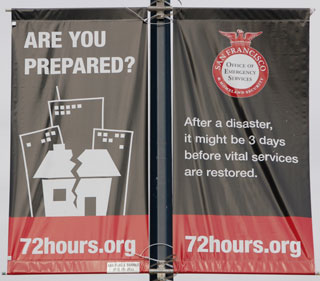
Bird flu. I'm not going to pretend I know a thing about whether it is going to make the leap and become a human pandemic, disrupting societies worldwide and killing millions. I can imagine it might. On the other hand, I can imagine our anxious flu vigil might turn out to be one of the many frightening phantoms we all feel hanging over us. Our species is modifying our global ecosystem so rapidly that we've come to distrust its very predictability.
We'd all be smart to visit the FluWiki and learn more.
But it is interesting to think about what we know about how people respond in a crisis. Since Hurricane Katrina, we're frequently lectured by various government bodies on how we should be prepared to take care of ourselves for 72 hours. Good idea I guess (and one of these days maybe I should get in some supplies.)
But what really cheers me up are stories of how very well ordinary people do when confronted with the impossible. Effect Measure shared a nice, light, story recently of British firefighters who cut through some prospective flu foolishness.
No nonsense there.Firefighters in the West Midlands said today they had been told to stop attending incidents involving birds as fears grew over avian flu....
Deputy chief fire officer Vijith Randeniya told staff in the leaked memo: "We are not to attend any calls to stranded or distressed birds even if requested by the RSPCA [Royal Society for the Prevention of Cruelty to Animals]."
The move could mean crews refusing to attend fires at pet shops and farms and homes with aviaries and pigeon lofts....
One firefighter said: "We normally attend all incidents involving animals if asked to by the RSPCA. It's utter nonsense and completely unworkable. What happens if we go to a house fire if they've got a pet budgie or aviary?
"Do we say 'sorry mate, we can't put out your fire because we might catch bird flu'?"
This accords with what disaster experts say about ordinary human response to unthinkable catastrophe: we tend to be more sensible than the authorities anticipate. Reuters Alertnet posts a "TIPSHEET: Aid experts debunk post-disaster myths." Number One on their list:
It seems likely that one reason our species has lasted this long is that helping save others helps us get a grip when confronted with catastrophe.MYTH: Disaster-hit people are too dazed and shocked to take responsibility for helping themselves and others. ...
But according to the 2004 World Disasters Report, published by the International Federation of Red Cross and Red Crescent Societies, in-depth reports from sudden disasters ranging from earthquakes to the collapse of New York's twin towers show survivors rushing to save people from under the rubble -- with their bare hands if necessary.
Adeel Jafferi, media officer for Islamic Relief, described such proactivity in the immediate aftermath of Pakistan's earthquake in October 2005:
..."On the day it happened, ordinary people were rushing to aid victims, despite the shock they felt themselves. I saw people on the street who were completely out of their minds with fear, and yet when they saw the need to help people and heard the screams from under buildings, they ran immediately and started helping."
The additional five myths on the Alertnet Tipsheet are also well worth pondering. They are
- MYTH: The best international response is to send in rescue teams immediately.
- MYTH: Dead bodies should be buried quickly to avoid disease.
- MYTH: Survivors have lost everything except the clothes they stand up in. The best response is to give them second-hand clothes.
- MYTH: The best way Westerners can help children who have been orphaned in a disaster is to adopt them.
- MYTH: The best way to help survivors is to put them in temporary settlements.
I have listened to a number of world health experts who consider this to be over hyped and as cover you ass stragety, should this "rare event occur" in their opinion. I'm not into conspiracy but I always like to follow the money...
ReplyDeleteDonald Rumsfeld Makes $5 Million Killing on Bird Flu Drug March 12, 2006
http://www.commondreams.org/headlines06/0312-06.htm
jt from BC
http://www.commondreams.org/
ReplyDeleteheadlines06/0312-06.htm
Very interesting..pandemics are I think inevitable.
ReplyDelete